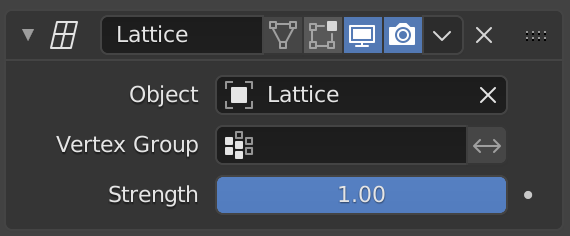Lattice Modifier¶
The Lattice modifier deforms the base object according to the shape of a Lattice object. Objects to be deformed can be meshes, curves, surfaces, text, lattices and even particles.
Nasvet
A Lattice modifier can quickly be added to selected objects by parenting them using the Lattice Deform option.
Options¶

The Lattice modifier.¶
- Object
The Lattice object with which to deform the base object.
- Vertex Group
An optional vertex group name which lets you limit the modifier’s effect to a part of the base mesh.
- Invert
<-> Inverts the influence of the selected vertex group, meaning that the group now represents vertices that will not be deformed by the modifier.
The setting reverses the weight values of the group.
- Invert
- Strength
A factor to control blending between original and deformed vertex positions.
Hints¶
Why would you use a lattice to deform a mesh instead of deforming the mesh itself in Edit Mode? There are a couple of reasons for that:
If your object has a large number of vertices, it would be difficult to edit portions of it quickly in Edit Mode. Using a lattice will allow you to deform large portions efficiently.
The smooth deformation you get from a Lattice modifier can be hard to achieve manually.
Multiple objects can use the same lattice, thus allowing you to edit multiple objects at once.
Like all modifiers, it is non-destructive. Meaning all changes happen on top of the original geometry, which you can still go back to and edit without affecting the deformation.
A lattice does not affect the texture coordinates of a mesh’s surface.
Opomba
When using a lattice to deform particles, order in the modifier stack matters. You need to place the Lattice modifier after the Particle System one.